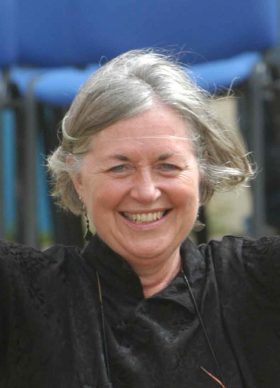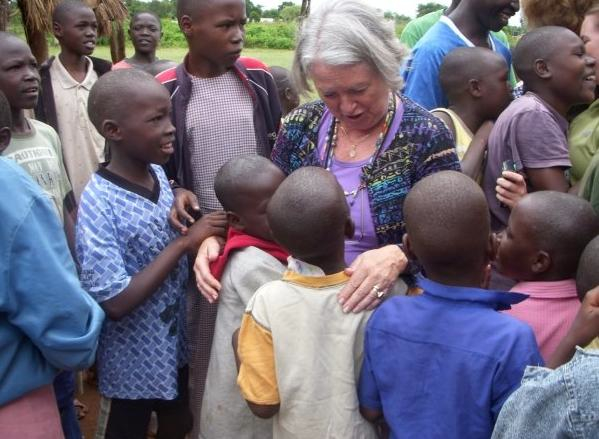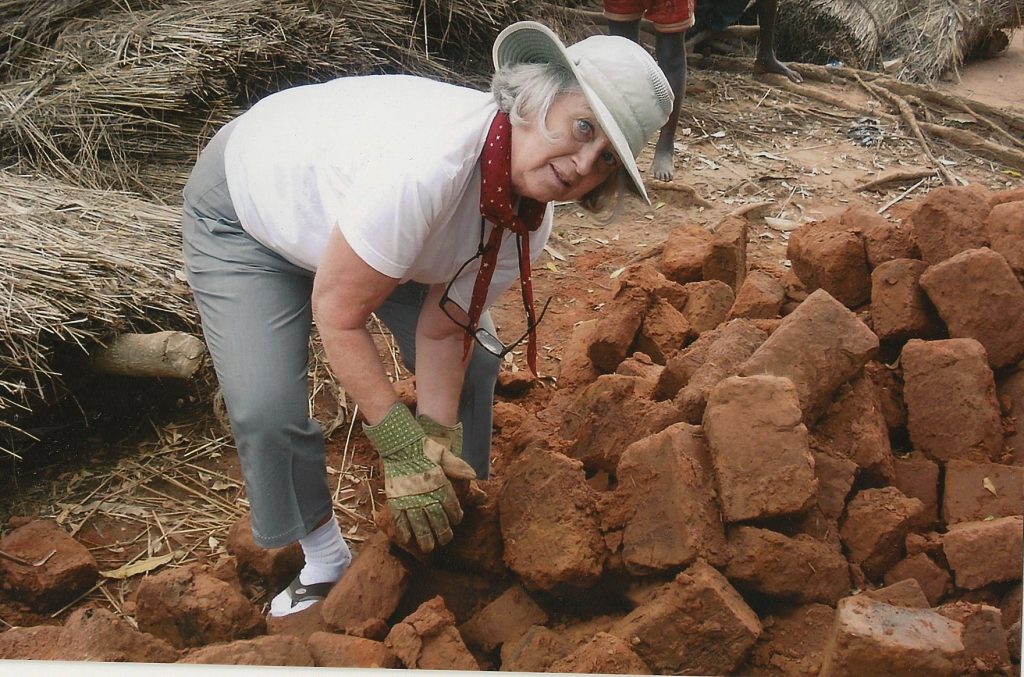Judy Dushku has built a life and career that suits her unique identity, although some may perceive contradictions in the multiple facets of her life: she was a single mother of four children who managed to introduce her children to world travel and people of many cultures; she is a stake Relief Society president whose husband is not a member of the Church of Jesus Christ of Latter-day Saints; she is an accomplished academic and the founder of a nonprofit in Uganda that works with survivors of war. She describes how her life has evolved, the choices that have shaped her path, and the importance of sisterhood along the way.
You are fearless in your approach to life—not afraid of meeting new people or being in new places. How did you cultivate that attitude?
My childhood has a lot to do with it. I was born right outside of Rexburg, Idaho to parents who wanted more than anything to get out of farming—and it was during the Depression—and leave the rural life. So my father joined the Navy and we spent years traveling all over the United States; we moved to a different part of the country about every two years. My parents were so happy with that arrangement, and I suppose I just internalized that. Every few years they said, “Where do we get to go next? Wherever it is, we’re going to meet great and interesting people, and we’ll find the Church and be helpful and serve.”
As a result, my growing up years were all about going someplace new, meeting new people, and finding a place to serve in the Church—whether on a welfare farm or building a chapel. My parents encouraged me to innovate within the Church. I am told that one day in a rented space where our small branch was meeting and many children were crying, I just stood up and offered to take care of the kids during Sunday School class and started a “primary.” It was always considered an adventure; it was never a chore or a burden or frightening. My parents perpetuated the attitude that we’d go where God wanted us—like the line in the hymn “Come, Come Ye Saints” that says “We’ll find a place which God for us prepared; where none shall come to hurt or make afraid” and then “all will be well.” I think that’s where I developed the attitude that there’s no place in the world that I’m afraid to go. That had a huge impact on me; I’m really fearless.
Also, although my parents weren’t political at all, they were appalled by the racism we saw when we lived in the South, and they took on the role of being bridge-builders. Wherever we were, they brought people together by having them over for dinner. It was part of our family routine to create an atmosphere in which people from different backgrounds would feel like they belonged. That was key in molding my sense of self: anyone is my friend, regardless of who they are. I have no trouble loving people from any culture, and if other people have trouble with it, I’ll help them get over it.

You’re also unafraid to question and grapple with inconsistencies, such as in politics or the Church. How have you found your place in those realms?
After attending high school in Michigan, I went to BYU, which was not a great fit. It seemed like everyone was from California or Utah and I felt like an outsider. I was excited to move to Boston for graduate school, and I was delighted by the diversity there and the Cambridge University Ward. I studied at The Fletcher School [at Tufts University] and planned to work for the State Department, but then the Vietnam War came along and blew my world apart. It raised a million issues, especially with my father being a military man. I didn’t know who to trust or what information was truth versus lies. I was going to get a PhD, but I instead decided to take a year off and I never went back. I think that was a turning point; I became much more of a questioner and became parts of groups that opposed the war. After that, Johnson’s Great Society shaped me, too. The women’s movement—around the time of the Equal Rights Amendment—became important in my life also. All these issues were on our minds around the question “What’s our place?” At that point [in 1974], a group of us—Mormon women in Cambridge—decided to start Exponent II, a revival of the Woman’s Exponent newspaper published by early members of the Relief Society [from 1872-1914]. That has played a big role in me feeling like the Church was always mine, because if something offended me at church, I could call up those women and talk it through. I still stay in touch with them. At about the same time, a very enlightened Institute Director also asked us to do a series of classes on the roles of women in the Church. That legitimized our more private dialogues and brought many more men and women into the discussion.
Can you say more about how Exponent II evolved and the role of those women in your life?
The women in Exponent II became like sisters. Without computers and email, we wrote and pasted up our newspaper on light boards, so we spent hours together going over articles that women had submitted about many topics. We knew each other so well, and if we had different views, we talked them through. Looking back, there could not have been a better and safer place to tangle with tough questions. We talked about changing the design of garments, why women don’t have formal Priesthood, and why the Church came in against the ERA when we had all voted for it in Massachusetts years before. We talked a lot about abortion rights since some older women had been counseled to terminate pregnancies in their early lives in Utah if they had measles or some other condition that might harm the baby. We talked about interracial marriage and how and when to limit family size. We covered so many troubling issues. Some women started coming to meet with us who had decided to leave the Church; they would say, “I have left the Church but I miss it. Can I become a member of Exponent II since there I can believe those things that seem true to me, but not feel forced to accept the teachings that go against my sense of what is ethical?” We always said there were no temple-recommend-type interviews for coming into Exponent II. There, we were all sisters and women. Exponent meetings were like Relief Society meetings, but with no fear of judgment or with no fear that someone would suggest that a comment was not in-line with LDS doctrine. One could hardly ask for a more perfect setting: love, openness, a spirit of wanting to be like the Savior, a shared heritage, and no judgment. Some meetings at my house lasted until morning. Since I had to work, I would say goodnight at 11:00 p.m., knowing the Exponent II sisters would not leave until maybe 4:00 a.m.
How have you fostered in your own children the openness to the world that your parents fostered in you?
When I left my graduate work, I got what I thought would be a temporary job at Suffolk University. It was a wonderful place with so much diversity: first-generation immigrants from Italy, Ireland, and Greece. That type of diversity was new to me. I married shortly thereafter and the staff at Suffolk was very supportive of my having children, even though the laws weren’t. They celebrated those births and didn’t treat them like they were hurting my career.
My marriage was a bad marriage, and I was divorced when I was pregnant with my fourth child. I didn’t have a lot of child support and I had these four little kids and I worried that I wouldn’t be able to provide my children with the same sort of exciting life that I had experienced—with so much travel and exposure to the world. My solution was that I decided to always have international students living in our house. We had 27 students over a span of about the same number of years: Bosnians, Zimbabweans, Chinese, Malians, and so on. Everybody lived here! They were mostly students who were attending Suffolk University. Everyone who lived here became like a family member. We didn’t have a separate apartment, so we were all sharing meals and space. I really just wanted my children to know people from everywhere.
Also, because I didn’t have a PhD and I needed to qualify for tenure, I ended up doing a lot of administrative things related to advising foreign students and managing student affairs. I also took students to about 24 different countries on study trips, so I was always traveling. Sometimes I could take my own children, too, and they traveled a lot—to places like Kazakhstan, Ukraine, Nicaragua, and more. I used to laugh, because my kids would say, “Mom, people think we’re rich because we’re always traveling.” And I’d think, “If they only knew! We have no money!”
As a consequence, my children are extremely international; they have never wondered where any place was located. All my kids seem very comfortable with people from anywhere. We’ve also been able to go visit many of the students who lived with us in their own countries, and it has been fabulous to see them in their lives there.
You’re very active in the LDS Church, but your husband isn’t a member. How does that work?
I remarried in 1991 and it has been a fabulous marriage. My current and forever husband has joined the ward but not the Church, so he attends the ward. It has been very liberating to have a husband who does not have faith crises! He accepts it as this quirky side of our lives and he’s very supportive. I admit that I sometimes get emotional in the temple and shed a few tears, but then I remember what I’ve told other woman in my situation: “If you live righteously, the Lord will figure it all out somehow, sometime.” I try to give that same comforting promise back to myself. It works.
In the last few years, you have undertaken a new project: founding a nonprofit in Uganda. How did that come about?
In 2001, Suffolk asked me to be the dean of their satellite campus in Senegal and they hired my husband, Jim, to be the operations officer there. The campus had about 125 students from all over Africa—from over 20 different countries. I loved it. I still keep in touch with several of them and occasionally someone will drop in from Zambia or Kenya or wherever. One thing that happened in Senegal was that I had students from Sierra Leone and Liberia. Those countries were going through terrible wars—child soldiers, massacres, horrible atrocities—and these students were refugees who had come to Senegal. Seeing this, Jim and I decided that after we returned to the United States, we wanted to do NGO work with women who had come out of conflict situations.
When we returned to the United States, we tried to come up with a plan. It wasn’t until 2009 when I took some students to Uganda that I met people who worked with former child soldiers and with women who had been abducted, taken into the bush, raped and had babies. It’s so awful that I can hardly believe it. I just loved them. I felt like it was my work—my calling. I went to the mission president there and he gave me a blessing that told me this was work I needed to do, which confirmed what I already felt. I usually feel confirmation of things after I’ve leapt into something.
I was already the stake Relief Society president in Boston at the time, and I talked to the stake president about starting this work in Uganda, along with everything else I was doing. He said that if I thought I could do all of it, I should go ahead. So I started this NGO called THRACE (Trauma Healing and Reflection Center) in Gulu. My husband is part of it and my daughter raised $30,000 to purchase land. To have my only daughter tremendously involved has been a real gift. THRACE is about healing people from trauma by building their confidence and helping them to find ways to support themselves. We have them teach others; it’s not just Americans going over and teaching everything. Gulu is a really beaten up place—it’s way up by the Sudanese border and has been a war zone for years—but I feel so comfortable there.
So many women were in the bush during their teenage and young adult years and their schooling ended at fifth grade. They came back traumatized, with no education and with multiple kids. They’re amazing: they love their children and are resilient, hard working, and excited about living. Some of them are married, but many of them have formed families with other women who have children and whose families were killed in the war. They have huts near each other and share child raising.
One of our first projects was building a bakery. We’re doing computer literacy and adult literacy. We also have women’s empowerment projects and volunteers from other countries [mostly the United States at this point] travel to Gulu and build something or do something that contributes to the women’s empowerment programs. The Church has provided some products—via the Humanitarian Department—to use in our Empowerment programs. I also work most closely with the branch president in Gulu, but it’s not a Mormon organization. It’s only two years old, but we’re buying land and building a center. We’ve already built huts for vulnerable widows in one part of Gulu. We’re going strong. It’s very hard work; I’ve never done something so hard in my life, except maybe being a parent. I absolutely love it. When I’m in Gulu and I’m sitting there in that little branch, I think, “The Lord wants me here.”
There is a theme in your life of working with women. How do you think your work in Uganda carries on that theme of sisterhood?
Once after a talk I had given about how much I loved working with women, a close friend observed: Judy, you are clearly heterosexual, but definitely homosocial. I suspect that is not an original idea, but I loved it then because it is true; I am drawn to working with women. In my university course, I feel no less enthusiastic about encouraging male students and I teach to them as much as I teach to the women students. And in my friendships, I have many male friends. But my comfort level soars when I get involved with any activity where I am working shoulder to shoulder with women. If think women carry many burdens—whether they are women of privilege or impoverished. I feel I understand the hidden and the obvious challenges of most women, and I feel drawn to listen and hear what they say, and offer any encouraging feedback that I can. I don’t usually offer solutions or say things like, “I know exactly how you feel.” That is never quite true. But I can say, “Tell me more. I am hearing you and I think I can understand what you are saying and maybe we can think of ways you might do something just a bit differently and resolve the issues before you.” I find that every woman has “a story” that is in some ways unique to her. I honor that in every sister that I meet—be it in Weston, Massachusetts, USA or in Gulu, Northern Uganda. One of our projects in Uganda is helping women write their own stories, and they love the idea. It makes them feel less invisible and forgotten by the world. How wonderfully empowering that is, just like it was for the early Exponent II women in the 1970s who felt ignored and misunderstood. I remember when we picked our Exponent II motto: “Am I not a woman and a sister?” It fits anywhere in the world.
At A Glance
Judy Dushku
Location: Watertown (Boston), MA
Age: 69
Marital status: Married to Jim Coleman
Children: 4 – Aaron is 39; Ben is 36; Nate is 35; Eliza is 31 (I have 4 step-
daughters: Lisa, Allison, Lesley, and Molly
Occupation: Associate Professor of Government (Comparative Politics + Gender and Politics)Suffolk University, Boston, MA
Schools Attended: BYU – graduated 1964; Fletcher School of Law and Diplomacy-Masters of Law and Diplomacy- 1966
Languages Spoken at Home: English
Favorite Hymn: “Redeemer of Israel” “Come, Oh Thou King of Kings”
On The Web: THARCE-Gulu, Inc.
Interview by Barbara Christiansen. Photos used with permission.
At A Glance


